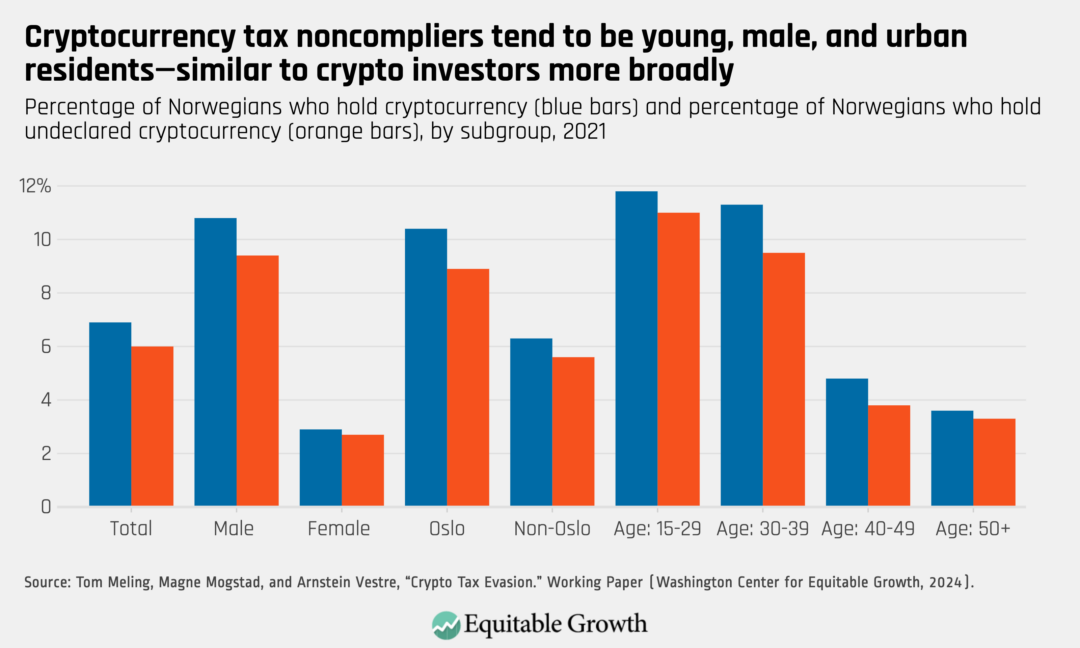Addressing pervasive tax evasion by cryptocurrency users

The price of bitcoin and other cryptocurrencies reached record highs last week, buoyed by the U.S. election of Donald Trump, who is seen as friendly to this novel asset class, for president. But as the buying, selling, and using of cryptocurrencies increase, so too will the tax consequences—and, perhaps, the tax avoidance—associated with these so-called digital assets.
Indeed, noncompliance with cryptocurrency tax liability is believed to be pervasive across the globe. As a result, governments are ramping up efforts to combat tax evasion in the crypto industry.
In the United States, for example, the IRS has started issuing subpoenas to major cryptocurrency exchanges for transaction data and sending liability reminder letters to taxpayers engaged in cryptocurrency transactions, which, under current rules, likely trigger capital gains tax. Yet there is little scientific evidence whether these increased tax enforcement efforts will pay off through recouped tax revenue.
Our recent research seeks to address these gaps in knowledge. We quantify the extent of cryptocurrency tax evasion and assess the efficacy of tax enforcement interventions. To do so, we leverage rich data from Norway that links investors’ cryptocurrency transactions to their tax returns and demographic characteristics.
While Norway has a much smaller population than the United States, it is a similarly open and wealthy economy. In fact, its Gross Domestic Product per capita was 8 percent higher than that of the United States in 2023 and, according to our evidence alongside surveys from the United States, Norwegians and Americans both increased their cryptocurrency holdings considerably between 2018 and 2022, making Norway a helpful exemplar for U.S. policymakers in this area.
Our paper finds that cryptocurrency tax evasion in Norway is pervasive, even among those using crypto exchanges that share identifiable trading data with tax enforcement agencies. At the same time, we find that the tax liability on cryptocurrency assets tends to be quite low, so we urge enforcement agencies to consider either very targeted or inexpensive efforts to address this widespread problem.
We’ll discuss each finding next, before closing with policy suggestions.
Cryptocurrency tax evasion is pervasive
We find that 6.9 percent of Norwegians held some cryptocurrency in 2021. But of those cryptocurrency owners, 88 percent failed to declare their holdings in their tax returns. This means that 6 percent of the broader Norwegian population are cryptocurrency tax noncompliers in the sense that they hold undeclared cryptocurrencies.
This does not mean that all of these taxpayers owe taxes on their holdings, but instead that they have failed to declare these holdings, a requirement of Norway’s wealth tax—though that tax only applies to single or married taxpayers with net wealth more than roughly $150,000 for single payers or $300,000 for married taxpayers filing jointly (in U.S. dollars). These noncompliers may also owe taxes on realized capital gains from cryptocurrency trading.
Our paper also shows that the majority of cryptocurrency tax noncompliers are male, young, and urban residents. (See Figure 1.)
Figure 1

We find that this concentration among young men in cities is driven by differences in cryptocurrency adoption across individual characteristics, not by differences in tax noncompliance conditional on holding cryptocurrency. This is arguably good news for tax authorities because it means they can use survey data on cryptocurrency adoption to better target tax noncompliers.
Cryptocurrency tax noncompliance is pervasive even among those using exchanges that share identifiable trading data with tax authorities
We find that 80 percent of those investors trading on Norwegian cryptocurrency exchanges fail to declare their cryptocurrencies to tax authorities—even though these exchanges share identifiable trading data with the Norwegian Tax Administration. At the same time, the majority of Norwegian cryptocurrency tax noncompliers do not trade on the domestic exchanges, meaning their trades (on foreign exchanges or directly on blockchains) are not reported to Norwegian authorities.
This is, in part, a composition effect. Since many Norwegian crypto investors exclusively trade outside the domestic exchanges, we would expect a large portion of noncompliance to happen in that setting. Yet behavior also plays a role: Those who trade outside the domestic exchanges have an even higher rate of tax noncompliance, perhaps because these investors have less understanding of their reporting obligations or because the lack of third-party reporting emboldens them to withhold information with perceived impunity.
Taken together, these results suggest that subpoenaing trading data from domestic exchanges by itself is not going solve the problem of tax noncompliance in the context of crypto.
Despite tax noncompliance, cryptocurrency investors owe a modest amount of taxes
We estimate that the average value of tax evasion across all cryptocurrency tax noncompliers is between $200 and $1,087 per person per year. This is largely a function of few taxable transactions and relatively small amounts of holdings.
This finding suggests that tax enforcement interventions need to be either well-targeted or cheap for the benefits to outweigh the costs.
Assessing the options for cryptocurrency tax enforcement
Building on these results, our paper then turns to the efficacy of two low-cost tax enforcement interventions. For each option, we compare the benefits in terms of increased cryptocurrency tax revenue against the cost of the intervention.
The first intervention involves indiscriminately sending letters to anyone who previously declared cryptocurrency in their tax returns but then stopped, reminding them that cryptocurrencies are taxable. We find that these reminder letters increase the probability of cryptocurrency tax compliance by about 25 percentage points and, on average, raise just enough tax revenue to cover the cost of the intervention.
The second intervention—a correspondence audit—involves sending letters to taxpayers requesting documentation (such as bank statements) to support the claims in their filed tax returns. We find that correspondence audits would be profitable if tax enforcement agencies could directly target cryptocurrency tax noncompliers. If tax authorities cannot directly identify cryptocurrency tax noncompliers, however, and must instead draw audit subjects from the broader population, we find that audits would be profitable only if targeted at a very narrow part of the population.
Indeed, we find that the optimal correspondence audit strategy is highly selective, targeting only individuals younger than 30 with incomes above the 98th percentile—a group that represents about 0.01 percent of the overall Norwegian population. Still, we find that the revenue gains from even such well-targeted audits would be modest and need to be weighed against the burden imposed on audited taxpayers, such as time costs and lawyer fees.
Conclusion
Our recent research finds that cryptocurrency tax noncompliance is pervasive, even among investors trading on centralized exchanges that share identifiable trading data with tax authorities. Yet because most crypto investors owe little in related taxes, tax enforcement needs to be either well-targeted or cheap for the benefits to outweigh costs. Current efforts to subpoena trading data from select cryptocurrency exchanges and to send reminder letters to suspected cryptocurrency tax noncompliers are, by themselves, unlikely to solve the problem of tax noncompliance in the crypto industry.
Did you find this content informative and engaging?
Get updates and stay in tune with U.S. economic inequality and growth!



